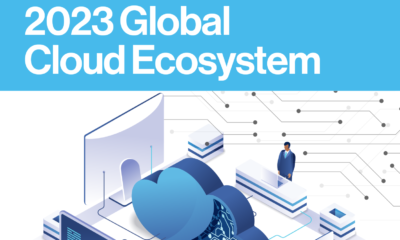Politics
Unleashing Women Entrepreneurs: Boosting Global Economy
Published
8 months agoon
By
Drew Simpson
On 21 September 2023, the United Nations (UN) demonstrated its commitment to inclusive funding by highlighting the importance of empowering female entrepreneurs to achieve gender equality and stimulate global economic growth. This undertaking includes implementing targeted measures that close the gender divide in entrepreneurship, such as collaborating with various governments, financial institutions, and private-sector organizations to improve women entrepreneurs’ access to capital, markets, and networks. Moreover, the UN focuses on providing mentorship programs, skills training, and education resources to enhance women’s abilities in successfully starting and scaling their businesses.
Building a Global Infrastructure for Women-led Businesses
In collaboration with numerous organizations, institutions, and governments, the UN is constructing an infrastructure that offers a range of resources, mentorship, education, and access to financing for women-led businesses worldwide. This global endeavor aims to foster the growth and development of female entrepreneurs, empower women, remove gender barriers, and ultimately spur economic growth through diverse and innovative enterprises. By forging close partnerships with many stakeholders, the UN aspires to create an ecosystem that supports and advances the aspirations of women entrepreneurs, leading to a more inclusive and equitable society.
Economic Impact and the Sustainable Development Goals
The UN seeks to fortify economies, build resilient communities, and achieve the Sustainable Development Goals (SDGs) by supporting female business owners and advocating for inclusive capital. Promoting gender equality in entrepreneurship drives economic growth and stimulates innovation and job creation locally and globally. Furthermore, female entrepreneurs bring fresh perspectives and ideas to the marketplace, addressing a broader range of societal needs and challenges in line with the SDGs.
Innovation, Diversity, and Social Impact
The UN’s emphasis on women’s entrepreneurship signifies its broader commitment to promoting innovation, diversity, and social impact, which are vital in shaping a more sustainable and inclusive global economy. By actively supporting and empowering female entrepreneurs, the organization furthers its objective of bridging gender gaps and fostering a more equitable setting for innovation. This strategy fuels economic prosperity and plays a crucial role in tackling various social challenges and ensuring lasting, positive change for communities worldwide.
Providing Resources and Networks for Women Entrepreneurs
Through various initiatives and partnerships, the UN assists women entrepreneurs in overcoming obstacles, securing vital resources, and connecting with a network of supportive peers, mentors, and industry professionals. These collaborations and resources equip women with the tools and know-how needed to successfully establish and grow their businesses, thus contributing to a more inclusive global economy. By empowering female entrepreneurs, the UN is cultivating greater gender equality, innovation, and sustainable development worldwide.
Achieving Gender Equality and Empowering Women and Girls
By undertaking these efforts, the United Nations strives to accelerate progress towards attaining gender equality and empowering women and girls across the globe. Consequently, many programs and initiatives have been introduced to address barriers impeding women’s rights and access to opportunities. By fostering a more inclusive and equitable society, the UN actively contributes to sustainable development and enhances the living conditions for women and girls worldwide.
Frequently Asked Questions (FAQ)
What is the UN’s commitment to empowering female entrepreneurs?
The United Nations is committed to empowering female entrepreneurs by implementing targeted measures that close the gender divide in entrepreneurship and collaborating with various governments, financial institutions, and private-sector organizations to improve women entrepreneurs’ access to capital, markets, and networks. Additionally, the UN provides mentorship programs, skills training, and education resources to enhance women’s abilities in starting and scaling their businesses successfully.
What is the purpose of building a global infrastructure for women-led businesses?
In collaboration with numerous organizations, institutions, and governments, the UN is constructing an infrastructure to offer a range of resources, mentorship, education, and access to financing for women-led businesses worldwide. This global endeavor aims to foster the growth and development of female entrepreneurs, empower women, remove gender barriers, and ultimately spur economic growth through diverse and innovative enterprises.
How does supporting female entrepreneurs contribute to achieving the Sustainable Development Goals (SDGs)?
Supporting female entrepreneurs contributes to achieving the SDGs by fortifying economies, building resilient communities, driving economic growth, stimulating innovation, and creating job opportunities locally and globally. Furthermore, women-owned businesses help address broader societal needs and challenges in line with the SDGs.
What is the role of innovation, diversity, and social impact in empowering female entrepreneurs?
The UN emphasizes innovation, diversity, and social impact to foster a more equitable setting for entrepreneurship, bridge gender gaps, and shape a more sustainable and inclusive global economy. By actively supporting and empowering female entrepreneurs, this strategy is crucial in tackling various social challenges and ensures lasting, positive change for communities worldwide.
How does the UN provide resources and networks for women entrepreneurs?
Through various initiatives and partnerships, the UN assists women entrepreneurs in overcoming obstacles to success by offering resources, connecting them with supportive peers, mentors, and industry professionals, and providing vital know-how needed to establish and grow their businesses. These collaborations help create a more inclusive global economy and cultivate greater gender equality, innovation, and sustainable development worldwide.
How do these efforts contribute to achieving gender equality and empowering women and girls globally?
By undertaking these efforts, the United Nations strives to accelerate progress towards attaining gender equality and empowering women and girls across the globe. Numerous programs and initiatives have been introduced to address barriers impeding women’s rights and access to opportunities. By fostering a more inclusive and equitable society, the UN actively contributes to sustainable development and enhances the living conditions for women and girls worldwide.
Featured Image Credit: Photo by KoolShooters; Pexels; Thank you!
Deanna Ritchie
Managing Editor at ReadWrite
Deanna is the Managing Editor at ReadWrite. Previously she worked as the Editor in Chief for Startup Grind and has over 20+ years of experience in content management and content development.
You may like
-


2023 global cloud ecosystem
-


How a tiny Pacific Island became the global capital of cybercrime
-


The growing signs of trouble for global carbon markets
-


Unmasking Oospy: dismantling global spyware menace
-


How generative AI is boosting the spread of disinformation and propaganda
-


Unleashing Smart Contracts for Business Breakthroughs
Politics
Fintech Kennek raises $12.5M seed round to digitize lending
Published
7 months agoon
10/11/2023By
Drew Simpson
London-based fintech startup Kennek has raised $12.5 million in seed funding to expand its lending operating system.
According to an Oct. 10 tech.eu report, the round was led by HV Capital and included participation from Dutch Founders Fund, AlbionVC, FFVC, Plug & Play Ventures, and Syndicate One. Kennek offers software-as-a-service tools to help non-bank lenders streamline their operations using open banking, open finance, and payments.
The platform aims to automate time-consuming manual tasks and consolidate fragmented data to simplify lending. Xavier De Pauw, founder of Kennek said:
“Until kennek, lenders had to devote countless hours to menial operational tasks and deal with jumbled and hard-coded data – which makes every other part of lending a headache. As former lenders ourselves, we lived and breathed these frustrations, and built kennek to make them a thing of the past.”
The company said the latest funding round was oversubscribed and closed quickly despite the challenging fundraising environment. The new capital will be used to expand Kennek’s engineering team and strengthen its market position in the UK while exploring expansion into other European markets. Barbod Namini, Partner at lead investor HV Capital, commented on the investment:
“Kennek has developed an ambitious and genuinely unique proposition which we think can be the foundation of the entire alternative lending space. […] It is a complicated market and a solution that brings together all information and stakeholders onto a single platform is highly compelling for both lenders & the ecosystem as a whole.”
The fintech lending space has grown rapidly in recent years, but many lenders still rely on legacy systems and manual processes that limit efficiency and scalability. Kennek aims to leverage open banking and data integration to provide lenders with a more streamlined, automated lending experience.
The seed funding will allow the London-based startup to continue developing its platform and expanding its team to meet demand from non-bank lenders looking to digitize operations. Kennek’s focus on the UK and Europe also comes amid rising adoption of open banking and open finance in the regions.
Featured Image Credit: Photo from Kennek.io; Thank you!
Radek Zielinski
Radek Zielinski is an experienced technology and financial journalist with a passion for cybersecurity and futurology.
Politics
Fortune 500’s race for generative AI breakthroughs
Published
7 months agoon
10/11/2023By
Drew Simpson
As excitement around generative AI grows, Fortune 500 companies, including Goldman Sachs, are carefully examining the possible applications of this technology. A recent survey of U.S. executives indicated that 60% believe generative AI will substantially impact their businesses in the long term. However, they anticipate a one to two-year timeframe before implementing their initial solutions. This optimism stems from the potential of generative AI to revolutionize various aspects of businesses, from enhancing customer experiences to optimizing internal processes. In the short term, companies will likely focus on pilot projects and experimentation, gradually integrating generative AI into their operations as they witness its positive influence on efficiency and profitability.
Goldman Sachs’ Cautious Approach to Implementing Generative AI
In a recent interview, Goldman Sachs CIO Marco Argenti revealed that the firm has not yet implemented any generative AI use cases. Instead, the company focuses on experimentation and setting high standards before adopting the technology. Argenti recognized the desire for outcomes in areas like developer and operational efficiency but emphasized ensuring precision before putting experimental AI use cases into production.
According to Argenti, striking the right balance between driving innovation and maintaining accuracy is crucial for successfully integrating generative AI within the firm. Goldman Sachs intends to continue exploring this emerging technology’s potential benefits and applications while diligently assessing risks to ensure it meets the company’s stringent quality standards.
One possible application for Goldman Sachs is in software development, where the company has observed a 20-40% productivity increase during its trials. The goal is for 1,000 developers to utilize generative AI tools by year’s end. However, Argenti emphasized that a well-defined expectation of return on investment is necessary before fully integrating generative AI into production.
To achieve this, the company plans to implement a systematic and strategic approach to adopting generative AI, ensuring that it complements and enhances the skills of its developers. Additionally, Goldman Sachs intends to evaluate the long-term impact of generative AI on their software development processes and the overall quality of the applications being developed.
Goldman Sachs’ approach to AI implementation goes beyond merely executing models. The firm has created a platform encompassing technical, legal, and compliance assessments to filter out improper content and keep track of all interactions. This comprehensive system ensures seamless integration of artificial intelligence in operations while adhering to regulatory standards and maintaining client confidentiality. Moreover, the platform continuously improves and adapts its algorithms, allowing Goldman Sachs to stay at the forefront of technology and offer its clients the most efficient and secure services.
Featured Image Credit: Photo by Google DeepMind; Pexels; Thank you!
Deanna Ritchie
Managing Editor at ReadWrite
Deanna is the Managing Editor at ReadWrite. Previously she worked as the Editor in Chief for Startup Grind and has over 20+ years of experience in content management and content development.
Politics
UK seizes web3 opportunity simplifying crypto regulations
Published
7 months agoon
10/10/2023By
Drew Simpson
As Web3 companies increasingly consider leaving the United States due to regulatory ambiguity, the United Kingdom must simplify its cryptocurrency regulations to attract these businesses. The conservative think tank Policy Exchange recently released a report detailing ten suggestions for improving Web3 regulation in the country. Among the recommendations are reducing liability for token holders in decentralized autonomous organizations (DAOs) and encouraging the Financial Conduct Authority (FCA) to adopt alternative Know Your Customer (KYC) methodologies, such as digital identities and blockchain analytics tools. These suggestions aim to position the UK as a hub for Web3 innovation and attract blockchain-based businesses looking for a more conducive regulatory environment.
Streamlining Cryptocurrency Regulations for Innovation
To make it easier for emerging Web3 companies to navigate existing legal frameworks and contribute to the UK’s digital economy growth, the government must streamline cryptocurrency regulations and adopt forward-looking approaches. By making the regulatory landscape clear and straightforward, the UK can create an environment that fosters innovation, growth, and competitiveness in the global fintech industry.
The Policy Exchange report also recommends not weakening self-hosted wallets or treating proof-of-stake (PoS) services as financial services. This approach aims to protect the fundamental principles of decentralization and user autonomy while strongly emphasizing security and regulatory compliance. By doing so, the UK can nurture an environment that encourages innovation and the continued growth of blockchain technology.
Despite recent strict measures by UK authorities, such as His Majesty’s Treasury and the FCA, toward the digital assets sector, the proposed changes in the Policy Exchange report strive to make the UK a more attractive location for Web3 enterprises. By adopting these suggestions, the UK can demonstrate its commitment to fostering innovation in the rapidly evolving blockchain and cryptocurrency industries while ensuring a robust and transparent regulatory environment.
The ongoing uncertainty surrounding cryptocurrency regulations in various countries has prompted Web3 companies to explore alternative jurisdictions with more precise legal frameworks. As the United States grapples with regulatory ambiguity, the United Kingdom can position itself as a hub for Web3 innovation by simplifying and streamlining its cryptocurrency regulations.
Featured Image Credit: Photo by Jonathan Borba; Pexels; Thank you!
Deanna Ritchie
Managing Editor at ReadWrite
Deanna is the Managing Editor at ReadWrite. Previously she worked as the Editor in Chief for Startup Grind and has over 20+ years of experience in content management and content development.
